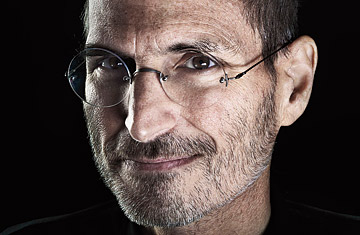
(2 of 6)
Then there's games. Many will see the iPad chiefly as a gaming platform. Michel Guillemot--founder of Gameloft, one of the most successful developers for the iPhone--is even more passionate about the iPad than Makinson and Futhey are. "I see this as the fourth step of the games evolution," he told me. "First the microcomputer, then the dedicated console, next the smart phone and now the iPad. What do you think?" "I'll let you know," I say, "when I've actually played with one."
And soon, I would. I thought I knew what to expect. For I've been playing with Apple products for a long, long time.
How Computing Became Fun
As the world prepares for the release of the iPad, the young--who may have seen the company only as the colossus behind the iMac, iPod and iPhone family of products and the iTunes and App stores that service them--might be surprised to know how hard the life of an Apple lover once was.
In 1984, Douglas Adams, author of The Hitchhiker's Guide to the Galaxy, was the first person in Britain to own a Macintosh computer, and I was the second. Goodbye, glowing green command line; hello, mouse, icons and graphical desktop with white screen, closable windows and menus that dropped down like roller blinds. Throughout the next decade I would regularly go round to Douglas' London house, floppy discs under my arm, and ring the doorbell.
"Is he in?" I would pant excitedly. Douglas' wife Jane would point with resigned amusement to the stairs, and I would hurl myself up them to swap files and play. We were like children with toy train sets. And that was part of the problem. It was such fun. Computing was not supposed to be fun. Douglas and I once spent two weeks redesigning our desktop icons and then asked Jane to judge the winner. She tactfully awarded us each first prize. We would have sulked for weeks otherwise. But we both wrote books and scripts on our Macs too; it was the first machine that would make you bounce out of bed in the morning eager to boot up and work.
Nonetheless, back in those days the Mac was derided as a toy, a media poseur's plaything and a shallow triumph of style over substance by those with a belief that computers, as utilitarian tools performing serious functions for business, should be under the control not of the user but of IT technicians and systems engineers. Despite the PC's eventual adoption of a Mac-style graphical user interface with the release of Windows 95, the damage had been done to Apple. By 1997, the company was in deep crisis. Douglas and I got used to the gloating sympathy of exultant PC users. "You'll soon be getting your spare parts and upgrades from hobbyist outlets and mail order," they chuckled. The specialist and business magazines agreed.
